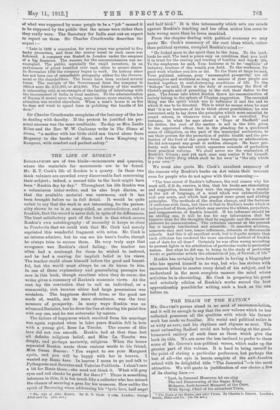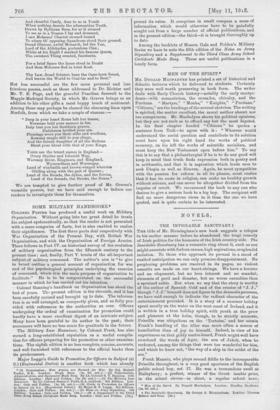THE BRAIN OF THE NATION.* GRAVES'S poems stand in no
need of recommendation,
and it will be enough to say that the new volume which he has collected possesses all the qualities with which his former work has made us familiar. His social and political satire is
as witty as ever, and his rhythms and rhymes as neat. The most unbending Radical could not help relaxing at the good- humoured raillery of such lines as those which give the book its title. We are none the less inclined to prefer to these some of Mr. Graves's non-political verses, which make up the greater part of this volume. It is bard to bring oneself to the point of stating a particular preference, but perhaps the last of all—the epic in heroic couplets of the anti-Jacobin school with its delightful title "The Jammiad "—is the most attractive. We will quote in justification of our choice a few of its closing lines :— " Last, in funereal Measures let me sing The sad Discrowning of the Sugar King Molasses, dark-brewed Monarch of the Cane, With Syrup, Chief of his attendant Train, • The Brisk, of the Nation. and other Verses. By Charles L. Graves. London' Smith, Elder and Co. LS,. ed. not.]
And cheerful Candy, dear to us in Youth When nothing daunts the adamantine Tooth.
Drawn by Hyblatan Bees, for so it soomod To me as in a Trance I lay and dreamed, I saw 1VIolassos' Chariot onward bound To whore th' opposing Squadrons stood their ground.
Dread Glucose, awful Monarch, led the Van, Lord of the Aldehydes, portentous Clan ; While at his Right I marked his famous Queen, The sweetest Thing created, Saccharin.
For a brief Space the Issue stood in Doubt And then Molasses fled in total Rout.
• •
Thy Law, dread Science, bans tho Cane-born Sweet, And leaves the World to Coal-tar and to Beet."
Not less successful are the few more personal and less frivolous poems, such as those addressed to Dr. Richter and Mr. T. E. Page, and the graceful Praedian farewell to the Magpie Madrigal Society, in which Mr. Graves brings as an addition to his other gifts a most happy touch of sentiment. Among those may perhaps be classed the charming lines upon Norfolk, from which we take a couple of stanzas :- " Deep in your heart Rome loft her traces, Normans hold your manors in fee. Italy lent you her Southern graces, Dutchmen bridled your sea.
Flemings wove you their silks and woollens, Romany magic still to you clings, And tho fairest daughter of all the Bullens Blent your blood with that of your Kings.
Yours aro the truest names in England- Overy Staitho and Icknicid Way, Wavoney River, Ringmere, and Ringland, Wymondham and Wormegay.
Land of windmills and brown-winged wherries Gliding along with the gait of Queens ; Land of the Broads, the dykes, and the ferries, Land of the Sounds, the l3rocks, the Donee."
We are tempted to give further proof of Mr. Graves's versatile powers, but we have said enough to induce our readers to investigate them for themselves.











































 Previous page
Previous page